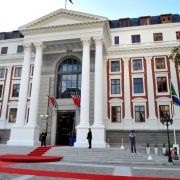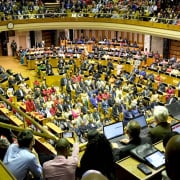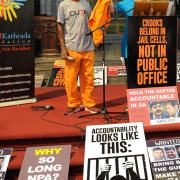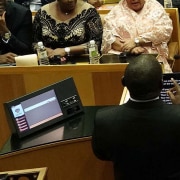|
Getting your Trinity Audio player ready...
|
Image: GovernmentZA / Flickr under CC BY-ND 2.0
By Kwazi Dlamini
South Africans, by now unsurprised at the blatant disregard those in government have for the poor and the rule of law, even during a pandemic, heard more ambitious words last night when President Cyril Ramaphosa delivered the 2021 State of the Nation address (Sona).
The alarming rate of corruption taking place in all spheres of government since Covid-19 reached the country’s shores, particularly in Personal Protective Equipment procurement, has left many hopeless and exasperated. In an attempt to revive hope and resuscitate the government’s soiled reputation, Ramaphosa spoke extensively into the matter of widespread corruption, as ordinary citizens waited to hear the government’s new feasible plan to fight extensive corruption within its ranks and protect public funds.
Ramaphosa revealed that government will be focusing on four pillars this year:
* dealing with Covid-19
* creating jobs and inclusive economic growth
* accelerating economic recovery
* fighting corruption.
However, to achieve the first three, the fourth one must be addressed.
Ramaphosa remarked that the government has made strides towards fighting corruption in the past two years. “We have acted decisively against state capture and fought back against corruption.”
At the same time he acknowledged that corruption is one of the greatest impediments to the country’s growth and development, and asserted that the government will not give up the fight.
Ramaphosa said the government has started with the implementation of the National Anti-Corruption Strategy that will be launched by mid-year.
“We therefore welcome the work of the joint government and civil society working group charged with developing a national anti-corruption strategy and implementation plan, which is close to completion of this phase of its work,” the president said.
However, he emphasised that the fight can only succeed if it is taken on by the whole of society, not government institutions only. “We need to work together to root out corruption and strengthen the rule of law. We should not solicit or pay bribes or engage in corrupt acts. We should upgrade our culture of reporting crime when we see it being committed.”
To further increase accountability, Ramaphosa said he would be signing performance agreements with all ministers before the end of February. These will be made public for people to hold those they elected into office to account.
Other anti-corruption measures highlighted by Ramaphosa included:
- The imminent appointment of members of a new National Anti-Corruption Advisory Council, which is a multi-sectoral body that will oversee the initial implementation of the strategy and the establishment of an independent statutory anti-corruption body that reports to Parliament.
- Decisive action against and investigation into reports of fraud and corruption in the procurement of Covid-19-related goods and services.
- The establishment of a fusion centre, which brings together key law enforcement agencies to share information and resources. The centre has brought many cases to trial and preserved or recovered millions of rands in public funds.
- The Special Investigating Unit was authorised to investigate allegations of unlawful conduct with respect to Covid-19 procurement by all state bodies during the national state of disaster. The SIU has finalised investigations into 164 contracts with a total value of R3.5-billion.
- The enforcement of the Political Party Funding Act, 2018 (Act 6 of 2018), which comes into operation on 1 April 2021. This will regulate public and private funding of political parties and requires, among other things, the disclosure of donations to parties and establishes two funds that will enable represented political parties to undertake their programmes.
Ramaphosa also mentioned the greater level of co-operation and collaboration between law enforcement agencies, noting that leadership positions in those bodies “have been filled with capable, experienced and trustworthy professionals”.








